In its second year, the Future of Pakistan Conference was co-organised by LSESU Pakistan Development Society, LSE South Asia Centre and LSE Pakistan Society at the Shaw Library, LSE. The conference had panel discussions on politics, economy and foreign policy, with Pakistani Prime Minister Shahid Khaqan Abbasi delivering the keynote address at LSE. Mahima A. Jain reports.
On 4 November 2017, Pakistani Prime Minister Shahid Khaqan Abbasi, while delivering the keynote address at the Future of Pakistan Conference at LSE, said: “Our youth is our real strength. Pakistan is a young country, and both the government and the private sector working on this.”
Mr Abbasi announced his commitment for a Jinnah Chair at LSE, which has over 105 students from Pakistan this year. LSE Director Dame Minouche Shafik chaired the event, noted that LSE’s engagements in South Asia are almost as old as the School. In 1911-12, LSE founders Sidney and Beatrice Webb visited schools, colleges and other institutions in Lahore, Peshawar and Lyallpur. She thanked the Prime Minister and alumni for their continued support.
The Prime Minister’s address was a culmination of the day-long Future of Pakistan Conference 2017, which had panel discussions on politics, economy and foreign policy. It was inaugurated by His Excellency S. Ibne Abbas, High Commissioner of Pakistan to the UK.
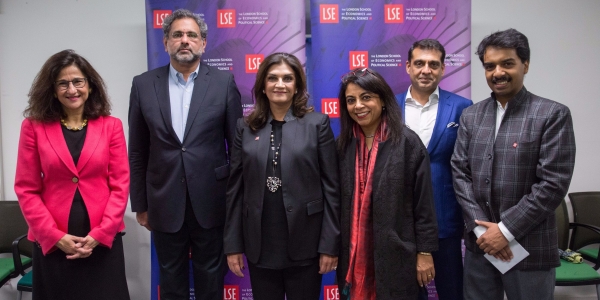
Politics
The politics panel was chaired by Hassan Miraj, with Dawn journalist Cyril Almeida, former Minister Qamar Zaman Kaira, Senator Abdul Qayyum as speakers. After briefly examining the history of Pakistan’s political landscape and the challenges since its formation, the question that remained pertinent to the discussion was that of the civil, military and political relations, the 2018 elections and freedom of democratic institutions in Pakistan.
Senator Abdul Qayyum said, “It is a firm belief that Pakistan can only go forward with a government by the people and for the people, and as per the Constitution with the Parliament as supreme. ”
Mr Almeida said there is a great likelihood that for the first time Pakistan will hold its third, historic democratic election next year. Although he added that a fair-minded assessment could not rule of a military take over.
He also acknowledged that this is a new era for Pakistan, as no single entity is currently calling all the shots but because of fractured politics, there is no clarity if one party that can win the elections. According Mr Almeida, the fight within the domain of political parties and within the government for who becomes Prime Minister, is not a flaw in the system. However, it is problematic if the attack is from outside the democratic system.
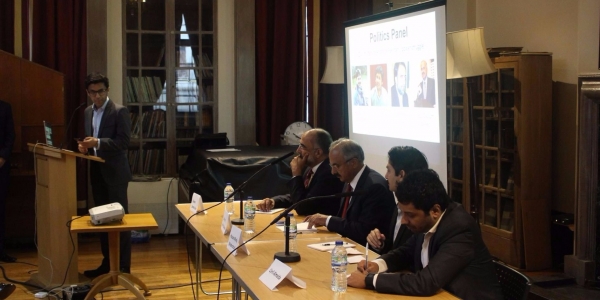
Pakistan’s politics has had a history of military takeovers, and according to Mr Kaira, former Minister for Information and Broadcasting, this has been due to weak democratic institutions. He was of the opinion that Pakistan started from a pathetic and humble situation, whereas India inherited several intact institutions. With regards to corruption, he said while the issue is not unique to Pakistan, it must be fought by strengthening institutions.
Hassan Miraj ended the panel and the Q&A round by a quote from House of Cards, “Proximity to power deludes some into thinking they wield it.”
Development
“Pakistan has come a long way, it’s a resilient country and amazing resources,” Dr Adnan Khan, Research and Policy Director, International Growth Centre, LSE, moderator of the Development Panel at FoP. The panelists were Miftah Ismail, Pakistani political economist and former member of the federal cabinet, and Dr Atif Ansar, Programme Director of the MSc in Major Programme Management (MMPM) at the Saïd Business School.
Drawing from his research and work as an academic, Dr Atif Ansar spoke on infrastructure and China Pakistan Economic Corridor (CEPC). He began by saying that Pakistan has tremendous possibility if infrastructure projects are done right.
“It is a very good time to build infrastructure. Money is cheaper, energy is cheap and labour is cheap. This is a historic moment for country of 200 million people,” he said. But the challenge is, he pointed out, infrastructure is typically done wrong.
Using China’s example, Dr Khan pointed out that whatever list of projects the Government gives one should drop it by a fifth and take up only the top most important ones. He added that Pakistan’s economy is very cash productive, and in the race for infrastructure that should not be destroyed. Pakistan’s democracy doesn’t allow land acquisition as done in China, and hence attention to social cohesion, environment and human rights is crucial, he said.
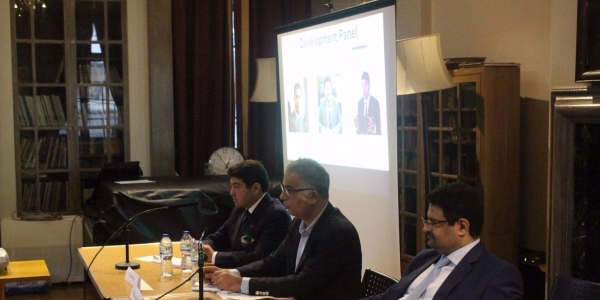
Miftah Ismail touched upon various key points from his experience as a Pakistani political economist who served as a member of the federal cabinet overseeing the Board of Investment. He noted that for a country of 200 million, Pakistan has only 1.2 million tax payers, making it the biggest challenge within the economy. Moreover, if Pakistan needs to absorb the incoming people in the market, the growth rate needs to be 6 percent while it’s still expected to be around 5.6 percent this year.
One reason why Pakistan lost its edge as an economy was because of poor or no investment in human capital and infrastructure, he explained. Touching on the issue of Pakistan’s energy crisis, he noted that the Government has built about 10,000 mw of energy and was on track to end load shedding by the end of November.
Foreign Policy
Moderated by journalist Aamir Ghauri, the speakers of this panel were Senator Sherry Rehman; Dr Farzana Sheikh, a specialist on Pakistan and the regional politics of South Asia; and Senator Abdul Qayyum
Ms Rehman started with pointing out that the language used for Pakistan’s foreign policy is always deeply problematic. There is always a “master” in the relationship. She added that the power and agency of 200 million people is stripped when people ask “who is in charge of foreign policy”. She added that Pakistan’s story is of a woman fighting to be heard.
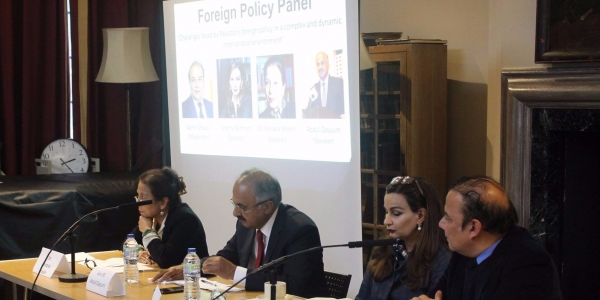
Moving away from the battle of the binaries which is raging between India, Pakistan and Afghanistan, is crucial, she said. She pointed out that Kabul and Kashmir are the biggest focus of Pakistan’s foreign policy, and the latter is back in the news not because of Islamabad, but because Kashmir brought itself back. While engaging with India, Ms Rehman said, it is important to not conflate Narendra Modi with India, because India is more than the sum of its parts, like everywhere else.
Pointing out that the single biggest threat to global order is extremism, and it is the biggest challenge in Pakistan, apart from our water deficit. “We have to understand the power of ideas is central to the 21st century. All this hate is based on exclusion, and that is the war of 21st century. There are no set piece battles,” she explained.
“It is not the battle of powers but the power of ideas,” she concluded.
Dr Farzana Sheikh took over and from Ms Rehman and started by saying that Pakistan still suffers from credibility deficit in international spheres. She noted that the relations between Pakistan and the US are deep, and that these two countries can’t have an easy exit. Pakistan’s immediate foreign policy challenges is to manage relationship with the US.
Senator Qayyum finally noted, “We want the best of relations with all super powers, with all super powers and our neighbours.” In South Asia, Kashmir is the flash point not Afghanistan, because both countries are nuclear powers, he noted.
“I was surprised about US South Asia policy, which spoke on Afghanistan and of Pakistan in humiliating language. But not a word on Kashmir,” he added.
In his concluding remarks Aamir Ghauri noted that Pakistan is forced to not go beyond India, Afghanistan when it comes to foreign policy.
Keynote address
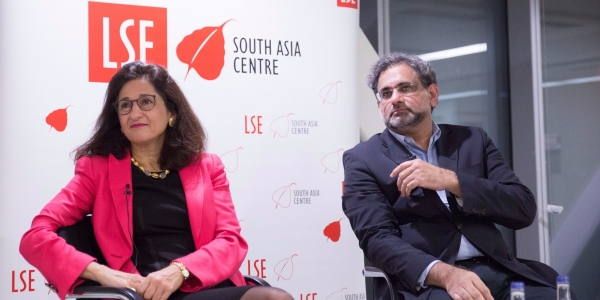
The even concluded with Pakistan Prime Minister Shahid Abbasi’s keynote address where he enthusiastically interacted with LSE students. The Prime Minister reaffirmed his commitment for the Jinnah Chair and research programme at LSE, so that issues confronting Pakistan could be explored further.
SAC Director Dr Mukulika Banerjee delivered the vote of thanks, and thanked the Prime Minister for the historic and momentous announcement.
Dr Banerjee shared her personal journey to Pakistan, and recalled that she was welcomed and looked after during her visit to KPK as a student at Oxford. She added that as Director of South Asia Centre it seemed appropriate to lead with research on Pakistan. She expressed her commitment to make South Asia Centre, LSE the go-to place on research and information on Pakistan in three years time.
The address was Live streamed on LSE’s official Facebook page and (as on November 9, 2017) it has over 16,000 views since November 4. To watch his speech click here.
This article gives the views of the author, and not the position of the South Asia @ LSE blog, nor of the London School of Economics. Please read our comments policy before posting.
About The Author
 Mahima A. Jain is blog editor at LSE South Asia Centre. She has a MA in Journalism and has worked as an editor and journalist in India. She tweets @mahima_a.
Mahima A. Jain is blog editor at LSE South Asia Centre. She has a MA in Journalism and has worked as an editor and journalist in India. She tweets @mahima_a.








